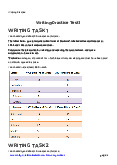





Preview text:
READING SKILLS PRACTICE R – EADING CLASS 1 (4) - Scanning
- Reading for details (Yes/No/NG – T/F/NG)
- Short answer questions
- Multiple choice questions - Sentence completion - Matching READING PASSAGE 1 Networking
Networking as a concept has acquired what is in all truth an unjustified air of modernity. It is
considered in the corporate world as an essential tool for the modern businessperson, as they trot
round the globe drumming up business for themselves or a corporation. The concept is worn like
a badge of distinction, and not just in the business world.
People can be divided basically into those who keep knowledge and their personal contacts to
themselves, and those who are prepared to share what they know and indeed their friends with
others. A person who is insecure, for example someone who finds it difficult to share
information with others and who is unable to bring people, including friends, together does not
make a good networker. The classic networker is someone who is strong enough within
themselves to connect different people including close friends with each other. For example, a
businessman or an academic may meet someone who is likely to be a valuable contact in the
future, but at the moment that person may benefit from meeting another associate or friend.
It takes quite a secure person to bring these people together and allow a relationship to develop
independently of himself. From the non-networker's point of view such a development may be
intolerable, especially if it is happening outside their control. The unfortunate thing here is that
the initiator of the contact, if he did but know it, would be the one to benefit most. And why?
Because all things being equal, people move within circles and that person has the potential of
being sucked into ever growing spheres of new contacts. It is said that, if you know eight people,
you are in touch with everyone in the world. It does not take much common sense to realize the
potential for any kind of venture as one is able to draw on the experience of more and more people.
Unfortunately, making new contacts, business or otherwise, while it brings success, does cause
problems. It enlarges the individual's world. This is in truth not altogether a bad thing, but it puts
more pressure on the networker through his having to maintain an ever larger circle of people.
The most convenient way out is, perhaps, to cull old contacts, but this would be anathema to our
networker as it would defeat the whole purpose of networking. Another problem is the reaction
of friends and associates. Spreading oneself thinly gives one less time for others who were
perhaps closer to one in the past. In the workplace, this can cause tension with jealous
colleagues, and even with superiors who might be tempted to rein in a more successful inferior.
Jealousy and envy can prove to be very detrimental if one is faced with a very insecure manager,
as this person may seek to stifle someone's career or even block it completely.
The answer here is to let one's superiors share in the glory; to throw them a few crumbs of
comfort. It is called leadership from the bottom. In the present business climate, companies and
enterprises need to co-operate with each other in order to expand. As globalization grows apace,
companies need to be able to span not just countries but continents. Whilst people may rail
against this development it is for the moment here to stay. Without co-operation and contacts,
specialist companies will not survive for long. Computer components, for example, need to be
compatible with the various machines on the market and to achieve this, firms need to work in
conjunction with others. No business or institution can afford to be an island in today's
environment. In the not very distant past, it was possible for companies to go it alone, but it is now more difficult to do so.
The same applies in the academic world, where ideas have been jealously guarded. The opening-
up of universities and colleges to the outside world in recent years has been of enormous benefit
to industry and educational institutions. The stereotypical academic is one who moves in a
rarefied atmosphere living a life of sometimes splendid isolation, a prisoner of their own genius.
This sort of person does not fit easily into the mould of the modern networker. Yet even this
insular world is changing. The ivory towers are being left ever more frequently as educational
experts forge links with other bodies; sometimes to stunning effect as in Silicon Valley in
America and around Cambridge in England, which now has one of the most concentrated
clusters of high tech companies in Europe.
It is the networkers, the wheeler-dealers, the movers and shakers, call them what you will, that
carry the world along. The world of the Neanderthals was shaken between 35,000 and 40,000
BC; they were superseded by Homo Sapiens with the very 'networking' skills that separate us
from other animals: understanding, thought abstraction and culture, which are inextricably linked
to planning survival and productivity in humans. It is said the meek will inherit the earth. But will they? Questions 1-5: D
o the following statements agree with the information given in reading passage 1? Write:
YES if the statement agrees with the writer's claims
NO if the statement contradicts the writer's claims Blurred content of page 3
is that of scientists as a soulless group unconcerned with ethical issues. And where is there a film sympathetic to science?
Part of the problem is the conflation of science and technology. The distinction between science
and technology, between knowledge and understanding on the one hand and the application of that
knowledge to making something, or using it in some practical way, is fundamental.
Science produces ideas about how the world works, whereas the ideas in technology result in
usable objects. Technology is much older than anything one could regard as science and unaided
by any science. Technology gave rise to the crafts of early humans, like agriculture and
metalworking. It is technology that carries with it ethical issues, from motorcar production to cloning a human.
By contrast, reliable scientific knowledge is value-free and has no moral or ethical value.
Science merely tells us how the world is. That we are not at the centre of the universe is neither
good nor bad, nor is the possibility that genes can influence our intelligence or our behaviour.
The social obligations that scientists have as distinct from those responsibilities they share with
all citizens comes from them having access to specialised knowledge of how the world works, not
easily accessible to others. Their obligation is to both make public any social implications of their
work and its possible applications and to give some assessment of its reliability.
It is not easy to find examples of scientists as a group behaving immorally or in a dangerous
manner, the classic paradigm being the eugenics movement. The scientific assumptions behind
this proposal are crucial; the assumption is that most desirable and undesirable human attributes
are inherited. Not only was talent perceived of
as being inherited, but so too were insanity and any kind of so-called feeblemindedness. They
completely failed to give an assessment of the reliability of their ideas. Quite the contrary, and
even more blameworthy, their conclusions seem to have been driven by what they saw as the
desirable social implications. By contrast, in relation to the building of the atomic bomb, scientists
behaved morally and fulfilled their social obligations by informing their governments about the
implications of atomic theory. It was an enormous engineering feat to build the bomb but the
decision to do this was taken by politicians, not scientists.
The moralists have been out in force telling us of the horrors of cloning. Many others, national
leaders included, have joined in a chorus of horror. But what horrors? What ethical issues? In all
the righteous indignation not a single relevant new ethical issue has been spelled out.
Those who propose to clone a human are medical technologists not scientists. It is not, as the
bio-moralists claim, that scientific innovation has outstripped our social and moral codes. Just the
opposite is the case. Their obsession with the life of the embryo has deflected our attention away
from the real issue, which is how children are raised and nurtured. The ills in our society have
nothing to do with assisting or preventing reproduction but are profoundly affected by how children are treated.
So what danger does genetics pose? Gene therapy, introducing genes to cure a genetic disease
like cystic fibrosis, carries risks, as do all new medical treatments. There may well be problems
with the testing of new treatments, but are these difficulties any different from those related to
trying out new drugs for AIDS? Anxieties about creating designer babies are at present premature
as it is too risky, and we may have, in the first instance, to accept what has been called procreative
autonomy, a couple's right to control their own role in reproduction unless the state has a
compelling reason for denying them that control. Should the ethical issues relating to the
applications of genetics, for example, lead to stopping research in this field? The individual
scientist cannot decide, for science, like genetics, is a collective activity with no single individual
controlling the process of discovery. It is ethically unacceptable and impractical to censor any
aspect of trying to understand the nature of our world. Questions 1-6
Do the following statements agree with the information given in Reading Passage 2?
1) The film industry does not make films about science
2) Scientists do not work in unison when deciding what needs to be researched.
3) Parents want to have cloned children now.
4) Technology was important before the development of science.
5) Many people consider cloning to be undesirable.
6) Science and Technology must be seen as separate entities. Question 7
Choose NO MORE THAN TWO WORDS from the passage for your answer.
7. What influenced the eugenics movement when they were summarizing the findings of
their research? _______________________________________ Questions 8-11
Choose ONE phrase from the list of phrases A - H below to complete each of the following sentences. Blurred content of page 6




